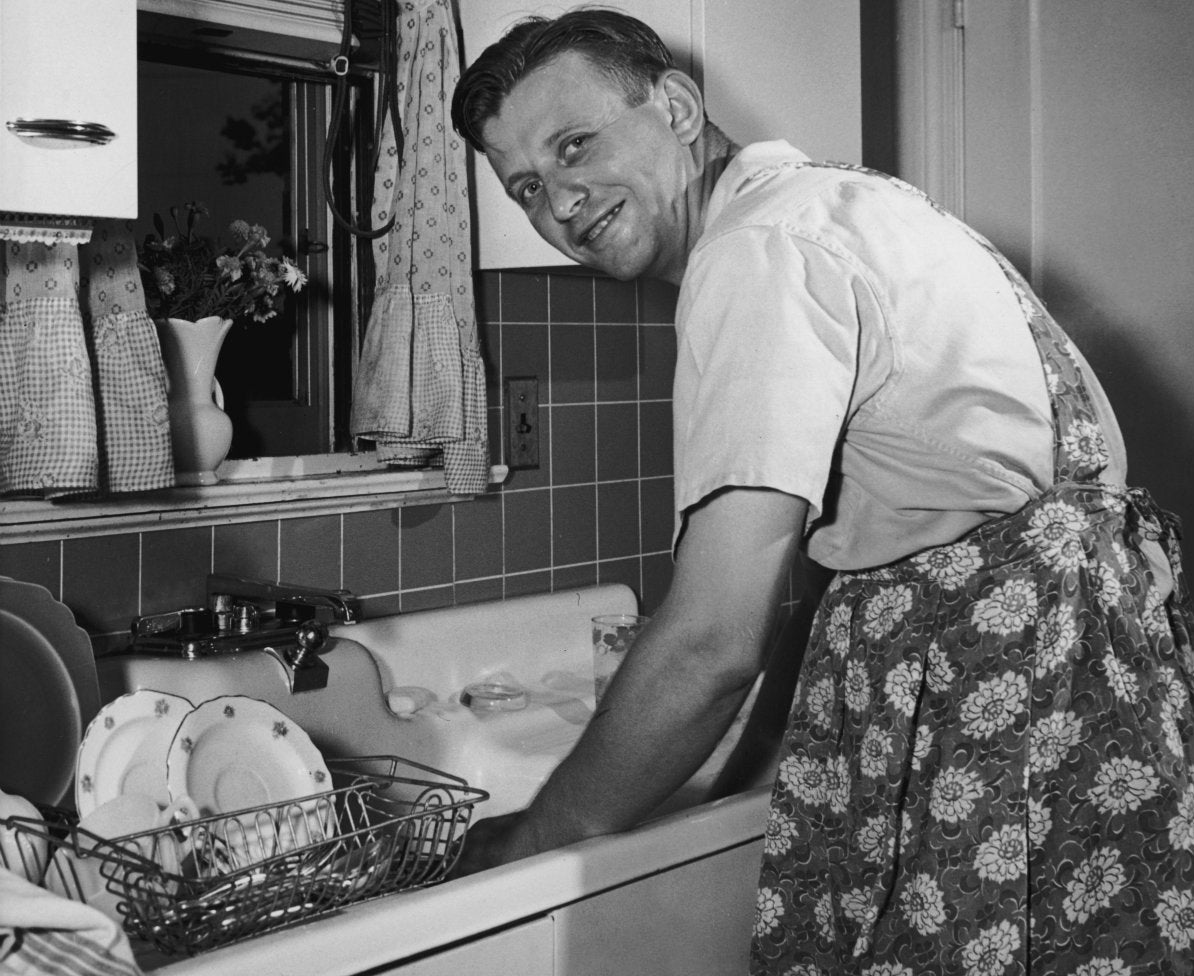The end of women—in the kitchen: A recipe for male success
Guys, feeling out of sorts? Lost that pep in your step? Then maybe it’s time to wash some dishes.

Guys, feeling out of sorts? Lost that pep in your step? Then maybe it’s time to wash some dishes.
A new study out of Sweden has found that men who don’t take half the responsibility of household chores are more likely to suffer from anxiety and restlessness and have trouble concentrating.
Call me wimpy or whipped but this makes perfect sense to me. What’s not to like about splitting the household burden? Shouldn’t it mean less conflict, a sense of control, and a more balanced relationship?
For all of Sweden’s social progressiveness, household work remains divided along strict gender lines, say the researchers from Umeå University, with women doing more household work yet more men saying the relationships are equal. This is why even though men feel worse when they don’t do chores, women—saddled with the heavier domestic load—reported even higher levels of distress.
Yet many of the men in the study also said they feel trapped by their gender role, stuck in a box of lawn mowing and car maintenance, so to speak. They’re not alone in this feeling.
I rail repeatedly against gatekeeping—when one spouse will not let the other into a specific sphere, like a mother refusing to let a father bathe the baby, or a guy bolting shut the tool shed to keep his wife away from the lawn mower.
And in terms of men doing “women’s work” like cleaning or childcare, I say it’s time to give men the chance to start failing then learning then finding their own level of competence (even if that level differs from their spouse).
Because your average guy won’t let the house and kids go to hell. Right?
Right?
In a recent essay in The Atlantic, Sandra Tsing Loh recites a litany of men failing at the most basic household duties. And in her new book “The End of Men,” Hanna Rosin tells a story about a stay-at-home dad who waits for his wife to come home to clean poop off the wall.
I’m too far from the US to judge how representative these stories are. In a Swedish context, they feel like dramatic exceptions rather than the rule, though, as the study shows, Sweden is far from the gender neutral paradise it is often portrayed as.
But let’s get past the messy relationship stuff. Men should also embrace chores for a more high achieving, less touchy-feeling reason—creativity. Research shows that our creativity is at its highest when our mind is engaged in slightly mindless tasks, allowing our subconscious to run free, make new connections and see things from a new point of view.
And in a digital, mobile, information society, this kind of creativity is more important than ever. Now sure, taking a shower, going for a walk and watching a football game also qualify as semi-mindless, creativity-boosting activities. But maybe it’s time for men to look closer to home, put away the golf clubs, and work on more productive ways to brainstorm, like washing dishes.
Of course, millions of men already are, and golf courses in the US are feeling the pain. But despite progress, men doing the laundry is still not the cultural norm.
In a post at A Big Creative Yes, Dan James takes the dishwashing example a step further and makes it about mindfulness, the feeling of the warm water and the joy of completing a given task.
Wow—a moment of Zen, creative ideas popping, domestic peace at home.
But seriously, this gets to the heart of the work-life challenge in our digital society. Gender roles at work are breaking down—with men suffering particularly during the recession – yet not shifting nearly as far at home. Disruption is hard—and comes with consequences—for both sexes. It’s not easy to break stereotypes and social patterns that are hundreds, if not thousands, of years old.
Yet in Silicon Valley, people also love to talk about disruption as opportunity. And it is here too, with men and women gaining the chance to redefine an out-of-date home arrangement. So, guys, let’s not make it harder than it has to be—I’m going to go scrub the bathroom floor.